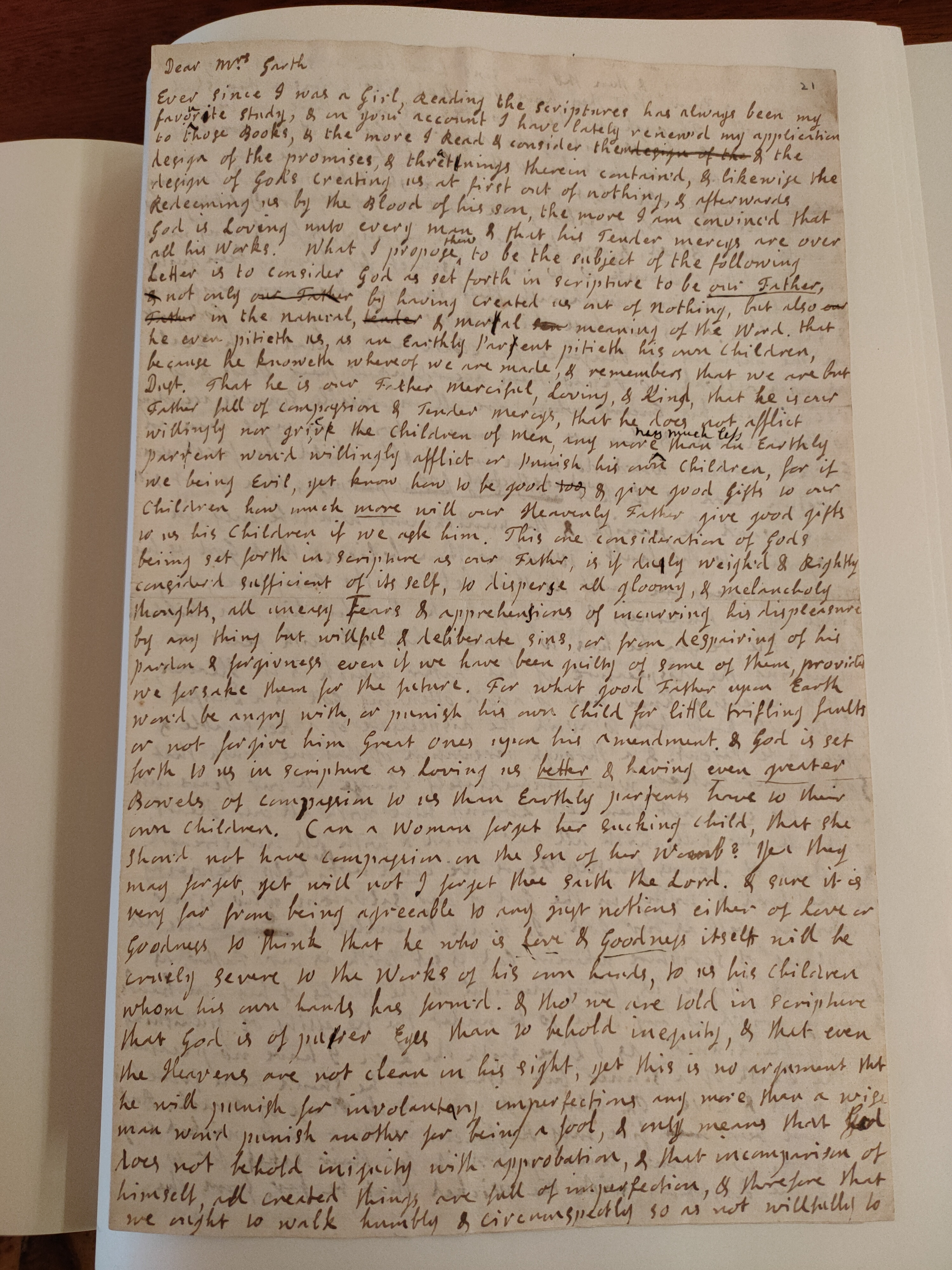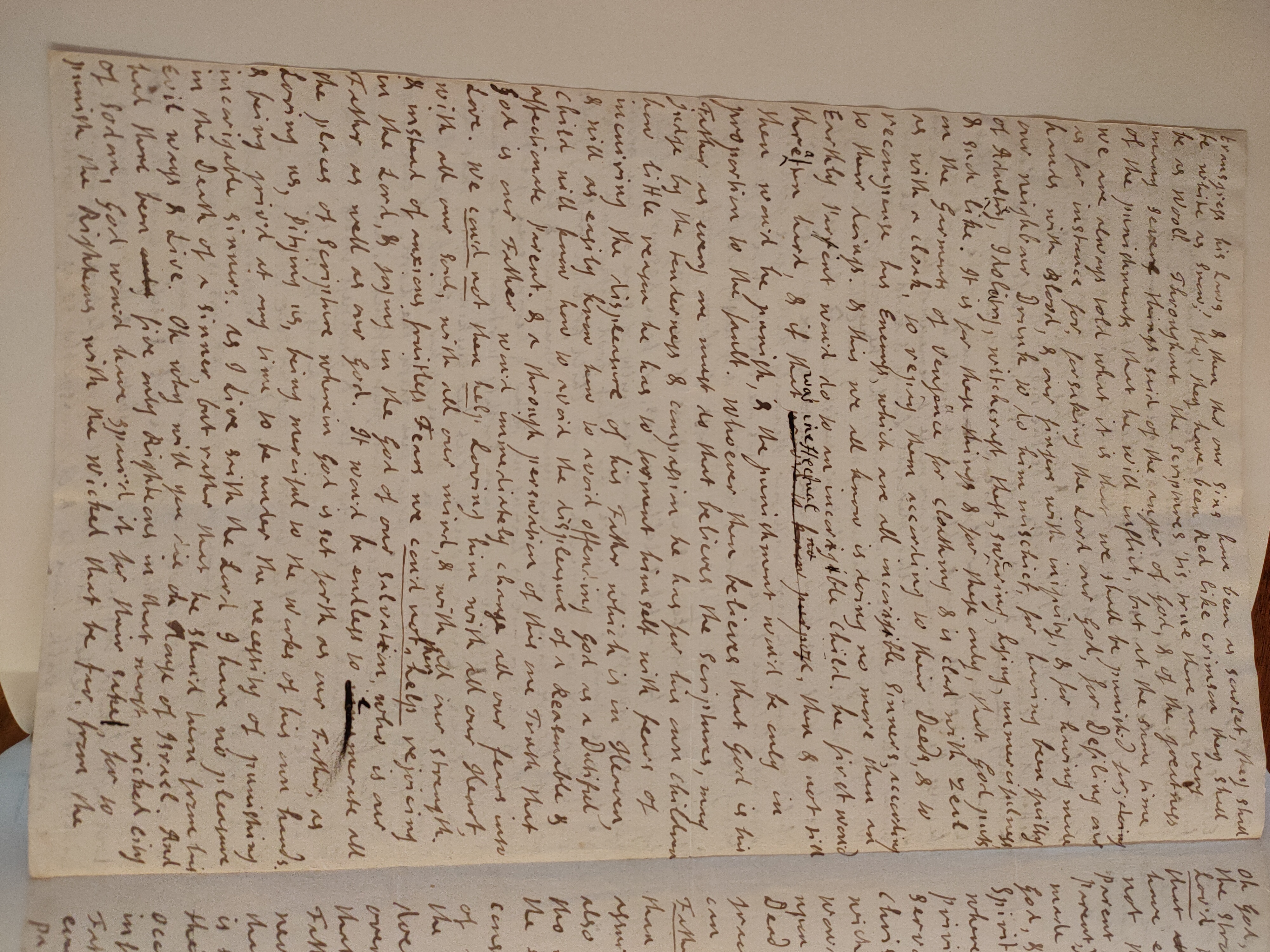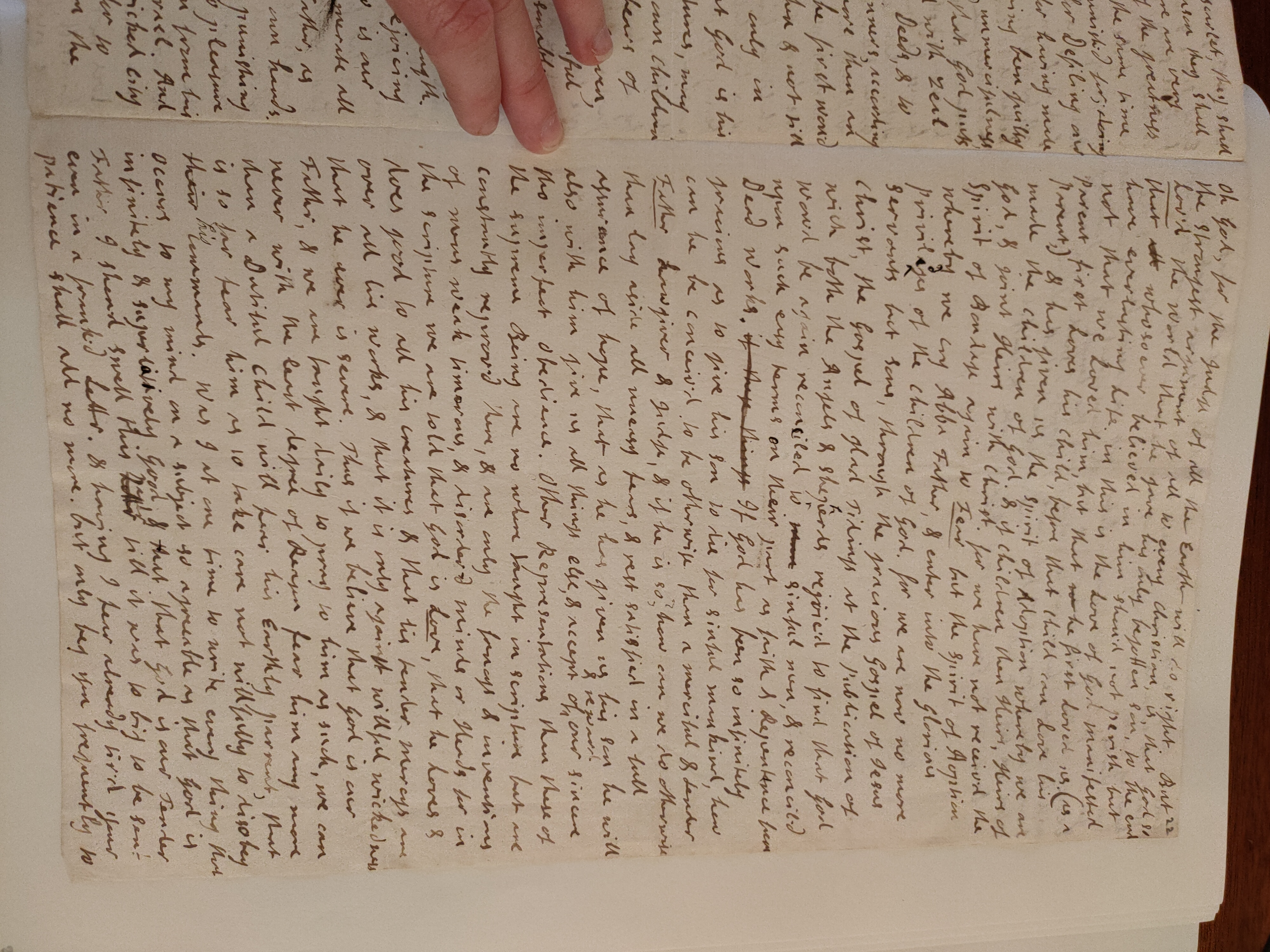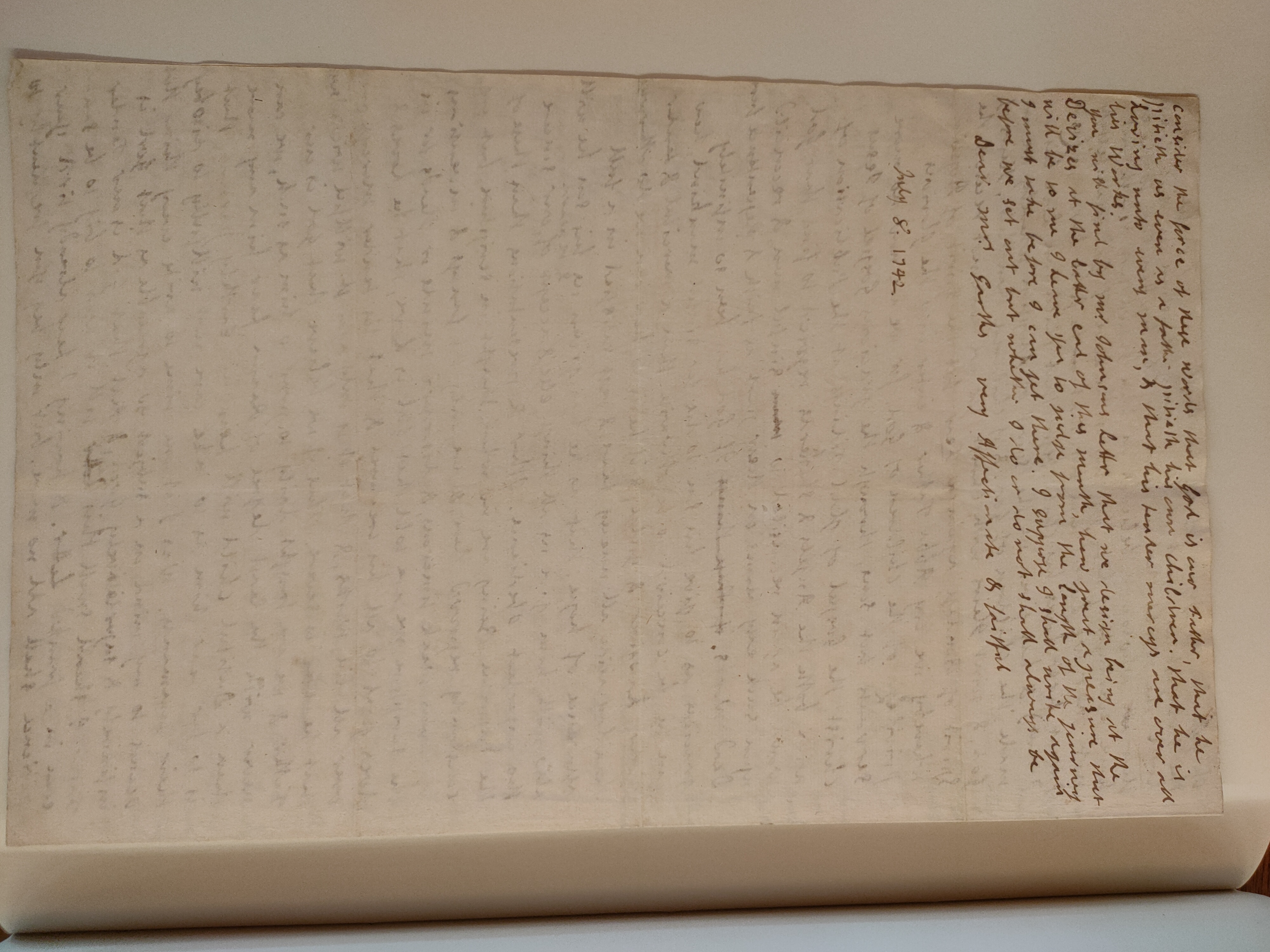1307 - Jane Johnson to Mrs Garth, 8 July 1742
- Transcription
- Letter Details
- People (1)
- How to Cite
Image 1 of 4

Image 2 of 4

Image 3 of 4

Image 4 of 4

Ever since I was a Girl, Reading the scriptures has always been my
favo{^u}rite study, & in your account I have lately renewed my application
to those Books, & the more I Read & consider them
design of the promises, & thre{^a}tnings therein contain’d, & likewise the
design of God’s creating us at first out of nothing, & afterwards
Redeeming us by the Blood of his son, the more I am convinc’d that
God is Loving unto every man & that his Tender mercys are over
all his Works. What I propose {^then} to be the subject of the following
Letter is to consider God as set forth in scripture to be our Father,
Father
he even pitieth us, as an Earthly Parent pitieth his own Children,
because he knoweth whereof we are made, & remembers that we are but
Dust. That he is our Father merciful, Loving, & kind, that he is our
Father full of compassion & Tender mercys, that he does not afflict
willingly nor gri{^e}ve the children of men, any more {^nay much less} than an Earthly
parent wou’d willingly afflict or punish his own children, for if
we being Evil, yet know how to be good
children how much more will our Heavenly Father give good gifts
to us his Children is we ask him. This one consideration of Gods
being set forth in scripture as our Father, is if duly weigh’d & Rightly
consider’d sufficient of its self, to disperse all gloomy, & melancholy
thoughts, all uneasy Fears & apprehensions of incurring his displeasure
by any thing but willful & deliberate sins, or from despairing of his
pardon & forgivness even if we have been guilty of some of them, provided
we forsake them for the future. For what good Father upon Earth
wou’d be angry with, or punish his own Child for little trifling faults
or not forgive him Great ones upon his amendment, & God is set
forth to us in scripture as loving us better & having even greater
Bowels of Compassion to us than Earthly parents have to their
own children. Can a woman forget her sucking child, that she
shou’d not have compassion on the son of her womb? Yet they
may forget, yet will not I forget thee saith the Lord, & sure it is
very far from being agreeable to any just notions either of Love or
Goodness to think that he who is Love & Goodness itself will be
cruely severe to the Works of his own hands, to us his children
whom his own hands has form’d. & tho’ we are told in scripture
that God is of purer Eyes that to behold inequity, & that even
the Heavens are not clean in his sight, yet this is no argument that
he will punish for involuntary imperfections any more than a wise
man wou’d punish another for being a fool, & only means that God
does not behold iniquity with approbation, & that incomparison of
himself, all created things are full of imperfection, & therefore that
we ought to walk humble & circumspectly so as not willfully to
[f.21v]
transgress his Laws, & then tho our Sins have been as scarlet, they shall
be white as snow; tho’ they have been Red like crimson they shall
be as Wooll. Throughout the Scriptures ‘tis true there are very
many severe things said of the anger of God, & of the greatness
of the punishments that he will inflict, but at the same time
we are always told what it is that we shall be punish’d for; doing
as for instance for, forsaking the Lord our God, for Defiling our
hands with Blood, & our fingers with iniquity, & for having made
our neighbour Drink to do him mischief, for having been guilty
of Adultr{^e}y, Idolatry, witchcraft, theft, sw{^earing, Lying, unmercifulness,
& such like. It is for these things & for these only, that God puts
on the Garments of venge{^a}nce for cloathing & is clad with zeal
as with a cloak, to repay them according to their Deeds, & to
recompense his Enemys, which are all incorrigible Sinners, according
to their doings. & this we all know is doing no more than an
Earthly Par
thre{^a}ten hard, & if that {^was ineffectual }
then wou’d he punish, & the punishment wou’d be only in
proportion to the fault. whoever then believes that God is his
Father as every one must do that believes the scriptures, may
judge by the tenderness & compassion he has for his own children
how little reason he has to torment himself with fears of
incurring the displeasure of his Father which is in Heaven,
& will as easily know how to avoid offending God as a Dutiful
child will know how to avoid the displeasure of a Reasonable &
affectionate Parent. & a through perswasion of this one Truth that
God is our Father wou’d immediately change all our fears into
Love. We cou’d not then help Loving him with all our Heart,
with all out Soul, with all our mind, & with all our strength
& instead of anxious fruitless Fears we cou’d not {^then}help rejoicing
in the Lord, & joying in the God of our salvation who is our
Father as well as our God. It wou’d be endless to
the places of scripture wherein God is set forth as our Father, as
Loving us, Pitying us, being merciful to the Works of his own hands.
& being griv’d at any time to be under the necessity of punishing
incorigable sinners, as I Live saith the Lord I have no pleasure
in the Death of a sinner, but rather that he shou’d turn frome his
Evil ways & Live. Oh why will you die oh {?thaye} of Israel. And
had more been
of Sodom, God wou’d have spar’d it for their sake, for to
punish the Righteous with the wicked that be far from the
[f.22]
oh God, for the judge of all the Earth will do right. But
the strongest argument of all to every Christian, is, that God so
Lov’d the World that he gave his only begotten son, to the end
that
have everlasting Life in this in this is the Love of God manifested
not that we Loved him, but that
parent first Loves his child, before that child can Love his
parent) & has given us the spirit of Adoption whereby we are
made the Children of God & if children then Heirs, Heirs of
God, & joint Heirs with Christ. for we have not receiv’d the
Spirit of Bondage again to Fear but the Spirit of Aoption
whereby we cry Abba Father, & enter into the Glorious
privili{^d}ges of the Children of God. For we are now no more
servants but sons, through the gracious Gospel of Jesus
Christ, the Gospel of glad Tidings at the publication of
wich both the Angels & Shep{^h}erds rejoic’d to find that God
woud be again reconciled to
upon such easy terms on their part as faith & Repentance from
Dead works.
gracious as to give his son to die for sinful mankind, how
can he be conceiv’d to be otherwise than a merciful & tender
Father Lawgiver & Judge, & if he is so, how can we do otherwise
than lay aside all uneasy fears, & rest satisfied in a full
assurance of hope, that as he has given us his son he will
also with him give us all things else, & accept {^& reward} our sincere
tho imperfect obedience. Other Representations that these of
the supreme Being are no where taught in scripture but are
constantly reprov’d there, & are only the fancys & inventions
of more weak timorous, & disorder’d minds or Heads for in
the scripture we are told God is Love, that he Loves &
does good to all his creatures & that his tender mercys are
over all his Works, & that it is only against willful wickedness
that he ever is severe. Thus if we believe that God is our
Father, & we are taught daily to pray to him as such, we can
never wish the least degree of Reason fear him any more
than a Dutiful child will fear his Earthly parent, that
is so far fear him as to take care not willfully to disobey
occurs to my mind on a subject so agreeable as that God is
infinitely & superlatively Good, & that that God is our Tender
Father I should swell this
even in a frank’d Lettr. & having I hear already tir’d your
patience shall add no more. but only beg you frequently to
[f.22v]
consider the force of these words that God is our Father, that he
pititeth us even as a father pitieth his own Children. that he is
loving unto every man, & that his tender mercys are over all
his Works.
you will find by Mr Johnsons Lettr that we design being at the
Devizes at the lattr end of this month, how great a peasure that
will be to you I leave you to judge from the Length of the journey
I must take before I can get there. I suppose I shall write again
before we set out but whither I do or not I shall always be
Dear MrsGarths very Affectionate & Faithful
Ever since I was a Girl, Reading the scriptures has always been my
favo{^u}rite study, & in your account I have lately renewed my application
to those Books, & the more I Read & consider them
design of the promises, & thre{^a}tnings therein contained, & likewise the
design of God’s creating us at first out of nothing, & afterwards
Redeeming us by the Blood of his son, the more I am convinced that
God is Loving unto every man & that his Tender mercies are over
all his Works. What I propose {^then} to be the subject of the following
Letter is to consider God as set forth in scripture to be our Father,
Father
he even pitieth us, as an Earthly Parent pitieth his own Children,
because he knoweth whereof we are made, & remembers that we are but
Dust. That he is our Father merciful, Loving, & kind, that he is our
Father full of compassion & Tender mercies, that he does not afflict
willingly nor gri{^e}ve the children of men, any more {^nay much less} than an Earthly
parent would willingly afflict or punish his own children, for if
we being Evil, yet know how to be good
children how much more will our Heavenly Father give good gifts
to us his Children is we ask him. This one consideration of Gods
being set forth in scripture as our Father, is if duly weighed & Rightly
considered sufficient of its self, to disperse all gloomy, & melancholy
thoughts, all uneasy Fears & apprehensions of incurring his displeasure
by any thing but wilful & deliberate sins, or from despairing of his
pardon & forgiveness even if we have been guilty of some of them, provided
we forsake them for the future. For what good Father upon Earth
would be angry with, or punish his own Child for little trifling faults
or not forgive him Great ones upon his amendment, & God is set
forth to us in scripture as loving us better & having even greater
Bowels of Compassion to us than Earthly parents have to their
own children. Can a woman forget her sucking child, that she
should not have compassion on the son of her womb? Yet they
may forget, yet will not I forget thee saith the Lord, & sure it is
very far from being agreeable to any just notions either of Love or
Goodness to think that he who is Love & Goodness itself will be
cruelly severe to the Works of his own hands, to us his children
whom his own hands has formed. & though’ we are told in scripture
that God is of purer Eyes that to behold inequity, & that even
the Heavens are not clean in his sight, yet this is no argument that
he will punish for involuntary imperfections any more than a wise
man would punish another for being a fool, & only means that God
does not behold iniquity with approbation, & that in comparison of
himself, all created things are full of imperfection, & therefore that
we ought to walk humble & circumspectly so as not wilfully to
[f.21v]
transgress his Laws, & then though our Sins have been as scarlet, they shall
be white as snow; though they have been Red like crimson they shall
be as Wool. Throughout the Scriptures ‘tis true there are very
many severe things said of the anger of God, & of the greatness
of the punishments that he will inflict, but at the same time
we are always told what it is that we shall be punished for; doing
as for instance for, forsaking the Lord our God, for Defiling our
hands with Blood, & our fingers with iniquity, & for having made
our neighbour Drink to do him mischief, for having been guilty
of Adultr{^e}y, Idolatry, witchcraft, theft, sw{^earing, Lying, unmercifulness,
& such like. It is for these things & for these only, that God puts
on the Garments of venge{^a}nce for clothing & is clad with zeal
as with a cloak, to repay them according to their Deeds, & to
recompense his Enemies, which are all incorrigible Sinners, according
to their doings. & this we all know is doing no more than an
Earthly Par
thre{^a}ten hard, & if that {^was ineffectual }
then would he punish, & the punishment would be only in
proportion to the fault. whoever then believes that God is his
Father as every one must do that believes the scriptures, may
judge by the tenderness & compassion he has for his own children
how little reason he has to torment himself with fears of
incurring the displeasure of his Father which is in Heaven,
& will as easily know how to avoid offending God as a Dutiful
child will know how to avoid the displeasure of a Reasonable &
affectionate Parent. & a through persuasion of this one Truth that
God is our Father would immediately change all our fears into
Love. We could not then help Loving him with all our Heart,
with all out Soul, with all our mind, & with all our strength
& instead of anxious fruitless Fears we could not {^then}help rejoicing
in the Lord, & joying in the God of our salvation who is our
Father as well as our God. It would be endless to
the places of scripture wherein God is set forth as our Father, as
Loving us, Pitying us, being merciful to the Works of his own hands.
& being grieved at any time to be under the necessity of punishing
incorrigible sinners, as I Live saith the Lord I have no pleasure
in the Death of a sinner, but rather that he should turn from his
Evil ways & Live. Oh why will you die oh {?thaye} of Israel. And
had more been
of Sodom, God would have spared it for their sake, for to
punish the Righteous with the wicked that be far from the
[f.22]
oh God, for the judge of all the Earth will do right. But
the strongest argument of all to every Christian, is, that God so
Loved the World that he gave his only begotten son, to the end
that
have everlasting Life in this in this is the Love of God manifested
not that we Loved him, but that
parent first Loves his child, before that child can Love his
parent) & has given us the spirit of Adoption whereby we are
made the Children of God & if children then Heirs, Heirs of
God, & joint Heirs with Christ. for we have not received the
Spirit of Bondage again to Fear but the Spirit of Aoption
whereby we cry Abba Father, & enter into the Glorious
privili{^d}ges of the Children of God. For we are now no more
servants but sons, through the gracious Gospel of Jesus
Christ, the Gospel of glad Tidings at the publication of
which both the Angels & Shep{^h}erds rejoiced to find that God
would be again reconciled to
upon such easy terms on their part as faith & Repentance from
Dead works.
gracious as to give his son to die for sinful mankind, how
can he be conceived to be otherwise than a merciful & tender
Father Lawgiver & Judge, & if he is so, how can we do otherwise
than lay aside all uneasy fears, & rest satisfied in a full
assurance of hope, that as he has given us his son he will
also with him give us all things else, & accept {^& reward} our sincere
though imperfect obedience. Other Representations that these of
the supreme Being are no where taught in scripture but are
constantly reproved there, & are only the fancies & inventions
of more weak timorous, & disordered minds or Heads for in
the scripture we are told God is Love, that he Loves &
does good to all his creatures & that his tender mercies are
over all his Works, & that it is only against wilful wickedness
that he ever is severe. Thus if we believe that God is our
Father, & we are taught daily to pray to him as such, we can
never wish the least degree of Reason fear him any more
than a Dutiful child will fear his Earthly parent, that
is so far fear him as to take care not wilfully to disobey
occurs to my mind on a subject so agreeable as that God is
infinitely & superlatively Good, & that that God is our Tender
Father I should swell this
even in a franked Letter. & having I hear already tired your
patience shall add no more. but only beg you frequently to
[f.22v]
consider the force of these words that God is our Father, that he
pititeth us even as a father pitieth his own Children. that he is
loving unto every man, & that his tender mercies are over all
his Works.
you will find by Mr Johnsons Letter that we design being at the
Devizes at the latter end of this month, how great a pleasure that
will be to you I leave you to judge from the Length of the journey
I must take before I can get there. I suppose I shall write again
before we set out but whither I do or not I shall always be
Dear MrsGarths very Affectionate & Faithful
Jane Johnson to Mrs Garth, 8 July 1742
A follow up to Johnson’s previous letter, in which she repeats her belief that God is not willingly cruel to the children he has created ‘of his own hands’. She compares God to an ‘earthly parent’ who would not wish to disproportionately punish their own child. God is merciful and has compassion for his own children, and the faithful should not torment themselves with the conviction that he is angry. Time is better spent loving God with all one’s heart, soul, and mind, than with groundless fears of God’s punishment. Reading the scriptures, and realising that God is presented as a merciful father, can help alleviate melancholy thoughts and fears. Johnson creates an analogy with the breastfeeding mother who cares for the child born of her womb. Indeed, representations of God as cruel or lacking in mercy have no basis in scripture, and are the inventions of disordered minds and heads. If Christians believe that God is their father, and they daily pray to him, then it is unreasonable to fear him. Were she to write everything in her mind on this subject, the letter would be too long to post.
Johnson Family
MS. Don. c. 190 f.21
Bodleian Libraries, University of Oxford
1742
7
8
Olney, Buckinghamshire [England]
[England]
primary author
heart
- devotional practice
- meditating
- thinking
- travel
- visiting
- writing
childhood
- apprehension
- love
- faith
- mind
- self
- soul
- thought
god
To Cite this Letter
Jane Johnson to Mrs Garth, 8 July 1742, 871742: Bodleian Libraries, University of Oxford, Johnson Family, MS. Don. c. 190 f.21
To Cite this Edition
Material Identities, Social Bodies: Embodiment in British Letters c.1680-1820. Compiled by: Karen Harvey, Helen Esfandiary, Sarah Fox, Emily Vine, University of Birmingham. Project funded by the Leverhulme Trust (2021-2025, Ref. RPG-2020-163), https://socialbodies.bham.ac.uk.